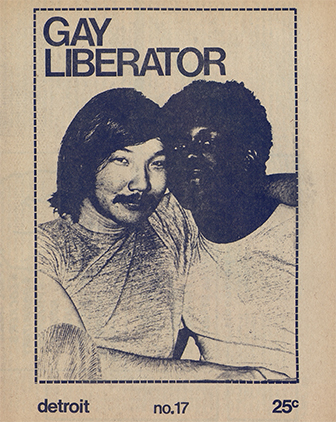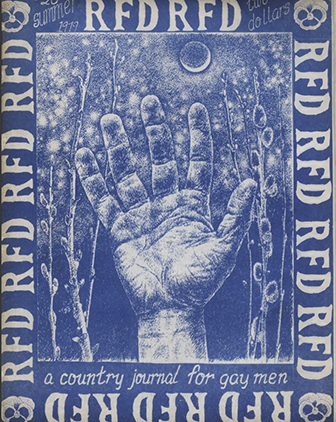
Subscribe to Pittwire Today
Get the most interesting and important stories from the University of Pittsburgh.An undergraduate researcher is taking a deep dive into LGBTQ publications

An intersectional publication from Detroit and a reader-written magazine from rural Iowa have caught the eye of an enterprising senior at Pitt.
With a $4,000 stipend from the Kenneth P. Dietrich School of Arts and Sciences, Regina Futcher is examining a decade of gay print media from the 1960s and 1970s, focusing in particular on two popular magazines, The Gay Liberator and RFD.
Futcher won a Summer Undergraduate Research Award (SURA) through the Office of Undergraduate Research.
The Gay Liberator, published monthly and bimonthly from 1971-1976 in Detroit, Michigan, caught Futcher’s attention for its championing of other minoritized voices besides the gay community. Inspired by the Stonewall riots in New York, the Detroit Gay Liberation movement was motivated to create content that inspired self-confidence and self-respect among gay communities to embrace their sexuality instead of hiding it, Futcher said. It also served as a news source.
“They very openly worked together with the Black Panthers. They talked about accepting each other and taking on each other’s plight which is something you don’t see as much in the 70s gay print,” said Futcher, a psychology and gender, sexuality, and women’s studies double-major with a minor in legal studies from the College of General Studies.
Meanwhile, at the same time in Iowa, a publication comprised almost entirely of reader submissions called RFD, or Rustic Fairy Dreams, began in 1974. “My research so far indicates that RFD was primarily used as a creative outlet to connect the rural gay community to each other,” through music, poetry, recipes, personal anecdotes and other lived experiences.
“It’s really rare for a gay publication from that time to still be going, but amazingly, it’s still publishing to this day,” said Futcher.
After finding some of their issues online, Futcher decided to reach out to them and was provided with over 75 fully digitized issues to comb through.
Instead of conducting interviews with older adults in Pittsburgh’s LGBTQ+ community, as was the original plan for her SURA project, Futcher pivoted due to COVID-19. Using an in-depth methodological approach to reading everything in the publication “often provides essential tidbits of information like financial resources or how the publication came about,” Futcher said.
“Using this approach allows me to make connections in Iowa and Detroit to the broader political context in the United States in the 1970s.”
Futcher, who uses she/they pronouns, resonated with both RFD and The Gay Liberator. “I identify as queer but never really engaged with the LGBT community until I got to Pittsburgh,” she said, adding that many of the other students in their SURA cohort are engaged in intersectional research on race this summer. “I hope academia becomes more diversified to include voices of queer researchers and researchers of color.”
Futcher, a senior, extended her graduation to August in order to finish the project.
“Regina’s project is super vital because it speaks directly to the question of community,” said Julie Beaulieu, a lecturer in gender, sexuality and women’s studies and Futcher’s faculty mentor throughout the SURA project. “How does newsprint foster collective consciousness and resiliency for LGBTQ people? Working with digital archives under COVID has meant a bit of reimagining research, but this crisis, together with the call to action for racial justice, has strengthened our need for community and coalition.”
Beaulieu added: “Working in the archives can be very transformative because researchers have the chance to tell untold stories and they get to see the imagined futures of their elders. As queer people, we are often cut off from our elders, and our queer history is buried or hidden, so archival work can produce a lot of feelings.
“We have a few new funding opportunities in the GSWS program, including the Thomas J. Peterson LGBTQ Studies Scholarship, which is dedicated to funding research related to LGBTQ history in Pittsburgh. We have also recently reached our goal of an endowed fund for LGBTQ research, a major project taken on by Pitt Queer Professionals. Supporting LGBTQ research is critical since the field is still marginal in some significant ways.”
“Working with Julie has been great,” said Futcher, who was introduced to Beaulieu a year ago through the Rainbow Alliance. “Julie’s really pushed me to become a better writer, thinker and feminist.”
Futcher is attending graduate school at Pitt’s School of Social Work in the fall, hoping to do a field placement that continues to blend archival research within the queer community and social work. “I’m hoping to continue to get a PhD to continue with research, supplementing it by engaging with the community face to face.”
Futcher also hopes to get part of her final SURA research paper published in RFD this summer. She’s already made inroads with the publishers there.
“Even though this is from the 1970s, I think these voices are worthwhile. I like looking at the archives because history tends to repeat itself. If I can see trends in the 70s and 80s, I can extrapolate from that and see what we can learn in 2020.”



